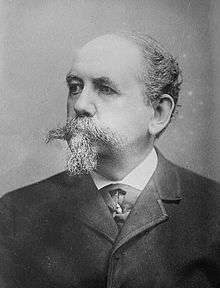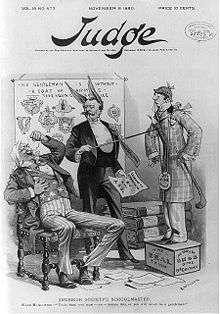Ward McAllister

Samuel Ward McAllister (December 1827 – January 31, 1895) was the self-appointed arbiter of New York society from the 1860s to the early 1890s.
Biography
Born Samuel Ward McAllister to a socially prominent Savannah, Georgia judicial family, established himself as a successful attorney in California during the Gold Rush. He used the earnings from his legal prowess to journey throughout Europe's great cities and spas—Bath, Pau, Bad Nauheim, and the like—where he observed the mannerisms of the titled nobility. Upon his return to the United States, McAllister settled in New York City with his wife, heiress Sarah Taintor Gibbons, whom he had married in 1852.[1] Using his wife's wealth and his own social connections (he was related to lobbyist Samuel Cutler Ward, who had married a granddaughter of John Jacob Astor), McAllister sought to become a tastemaker amongst New York's "Knickerbocracy", a collection of old merchant and landowning families who traced their lineage back to the days of colonial New Amsterdam.[2] Above all in McAllister's life was his desire for social recognition and what he termed "Tong," the cream of society.
Although purported to be an index of New York's best families, McAllister's list was suspiciously top-heavy with nouveau riche industrialists and McAllister's southern allies, seeking a new start in the nation's financial capital after the American Civil War. In his glory, McAllister referred to his patroness, Mrs. Caroline Astor (The Mrs. Astor), as his "Mystic Rose".[3] McAllister was an early summer colonist of Newport, Rhode Island, and was largely responsible for turning the simple seaside resort into a Mecca for the pleasure-seeking, status-conscious rich of the Gilded Age. His gift for party and picnic planning soon made him a society darling.[4]
Among the undesirables McAllister endeavored to exclude from the charmed circle of the Four Hundred were the many nouveau riche Midwesterners who poured into New York seeking social recognition. In 1893, McAllister wrote a column about the 1893 World's Columbian Exposition in which he urged that if Chicago society hostesses wanted to be taken seriously, they should hire French chefs and "not frappé their wine too much." The Chicago Journal replied, "The mayor will not frappé his wine too much. He will frappé it just enough so the guests can blow the foam off the tops of the glasses without a vulgar exhibition of lung and lip power. His ham sandwiches, sinkers, and ... pigs' feet, will be triumphs of the gastronomic art."
McAllister's downfall came when he published a book of memoirs entitled Society as I Have Found It in 1890.[5] The book, and his hunger for media attention, did little to endear him to the old guard, who valued their privacy in an era when millionaires were the equivalent of modern movie stars.
In disgrace, McAllister died while dining alone at New York's Union Club, in January 1895. His funeral, held on February 5, 1895, was well attended by many society figures of the day, including Chauncey Depew and Cornelius Vanderbilt II.[6] McAllister is interred at Green-Wood Cemetery in Brooklyn, New York.
"The Four Hundred"
McAllister coined the phrase "The Four Hundred". According to him, this was the number of people in New York who really mattered; the people who felt at ease in the ballrooms of high society ("If you go outside that number," he warned, "you strike people who are either not at ease in a ballroom or else make other people not at ease."). The number was popularly supposed to be the capacity of Mrs William Backhouse Astor Jr.'s ballroom.[7] The Four Million, the title of a book by O. Henry, was a reaction to this phrase, expressing O. Henry's opinion that every human being in New York was worthy of notice.
References
- ↑ Ward McAllister (1890) Society as I Have Found It, Cassell, New York
- ↑ Vanderbilt II, Arthur T. Fortune's Children. Wm. Morrow and Co., 1989: 90-93. ISBN 0-688-07279-8
- ↑ Vanderbilt, 97.
- ↑ Gavan, Terrence. 'The Barons of Newport: A Guide to the Gilded Age'. Newport: Pineapple Publications, 1998. p. 11. ISBN 0-929249-06-2
- ↑ Ward McAllister (1890) Society as I Have Found It, Cassell, New York
- ↑ Homberger, Eric. Mrs. Astor's New York: Money and Social Power in a Gilded Age. Yale University Press, 2002: 150–152. ISBN 0-300-09501-5
- ↑ Vanderbilt, 98.
- Social Crimes, by Jane Stanton Hitchcock.
External links
| Wikimedia Commons has media related to Ward McAllister. |
- McCallister biography at "Class and Leisure at America's First Resort"
- Biographical sketch at The History Box
